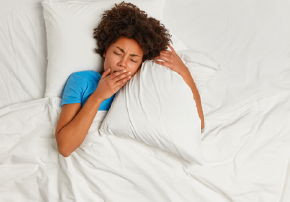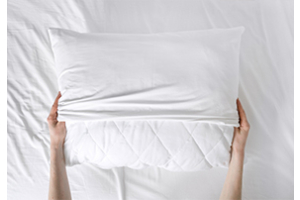How Can a Sedentary Lifestyle Lead to Sleep Problems?

Not Sleeping Well? Something Needs To Shift.
It's referred to as sedentary behaviour, or SB. Whether you're a TV coach potato, a deskbound workaholic, or a habitual gamer, depriving your body of sufficient physical activity can affect your well-being, not least your sleep health.
There are numerous studies on the effects of SB, both physically and mentally. More broadly, SB can be described as a physical posture or demeanour – like slouching, leaning or reclining in one position – with minimal shifting or movement over excessive periods. People who spend long, concentrated periods without moving or alleviating their posture, are at risk of developing SB-related disorders.
So, stand up, take a quick stretch, and let’s get into this.
How does daytime activity affect sleep?
Sleep scientist, Dr Dale Rae, gives us a few insights. We know that at night time our body is focused on rest. In fact, this time is meant for replenishing and restorative rest. While we sleep, our body is actively processing the day’s cognitive experiences into memories – our brain health. It’s also revitalising our body tissue and immune system – our overall physical health.
But, sleeping is as sedentary as it gets, surely? And getting proper sleep is considered healthy. So, what’s wrong with being less active during the day?
Fair question. Here’s why.
"In order for us to achieve good quality sleep at night, we need to contrast it with healthy day-time activity." This is part of what we call sleep hygiene which helps to maintain strong circadian rhythms. In order to achieve good-quality sleep, our brains need to be thinking during the day, we need to eat a healthy enough diet, get some moderate exercise and, preferably, have regular time outside under natural sunlight. This all then helps create a contrast between day and night which allows our body to better anticipate and initiate sleep.
Sedentary behaviour and sleep.
How exactly can sedentary behaviour affect our sleep?
Sedentary behaviour can increase our risk of developing a mental or physical disorder, which in turn can impact our sleep. And once that happens, we may become stuck in a cycle of night-time sleep problems with daytime sluggishness, which likely only exacerbates daytime sedentary behaviour. Again, we’re seeing the importance here of maintaining appropriate daytime and night-time behaviours or good sleep hygiene.
Long spells sitting hunched over a computer can cause stiffness in the neck and back. This does not bode well for a good night’s sleep. A healthy spine alignment is important for good, quality sleep. The risk of anxiety and depression is greater with a sedentary lifestyle. Again, this can result in disturbed or disordered sleep. Sedentary behaviour may also lead to weight gain which can increase the risk and severity of obstructive sleep apnoea. This is a sleep disorder in which the airway collapses either partially or totally as the muscles of the throat relax during sleep, causing problems breathing. These interruptions in breathing disrupt a person’s sleep, causing fragmented sleep and straining the cardiovascular system.
How to combat sedentary behaviour.
Alarmingly, an Australian review* goes so far as to suggest that sedentary behaviour is the “new smoking”. So, sedentary behaviour is certainly something you want to quit. You have only to reflect on your own daily routine. Do you sit for long periods staring at a screen? If you’re working from home, are you regularly tempted to ‘take it easy’ on the sofa or even your bed? Do you find that you’re not quite yourself lately? A bit grouchy, or slightly withdrawn, perhaps?
“Sedentary behaviour,” notes Dr Rae, “can be seen as a lack of routine. It’s simply ‘going through the motions’ (well, non-motion, really). Consider adding a healthy routine to your day. Take purposeful breaks to walk, take a midday run, or put in a concerted hour of exercise. Take regular breaks away from your desk. These are all ways of contributing to better sleep hygiene, affording you a much better chance of deep, quality sleep each night.”
Don’t just sit there. Get to Dial•a•Bed!
Healthy sleep hygiene, along with the perfect comfort and support in a mattress, is what you really want to aim for. If you’re taking care of a healthy routine by day, you want to afford yourself the very best, quality sleep by night. Visit www.dialabed.co.za and shop through every conceivable level of support and comfort. Then pop into your nearest Dial•a•Bed store and do a routine Sleep Station Test. Take active control of the sleep you need. And deserve. #SleepForLife.
TAKE CARE: Lifestyle recommendation is not medical advice. Always consult your healthcare professional should you be experiencing prolonged sleep difficulties or related health issues. *The Dangers Of Sitting: Why Sitting Is The New Smoking – www.betterhealth.vic.gov.au






